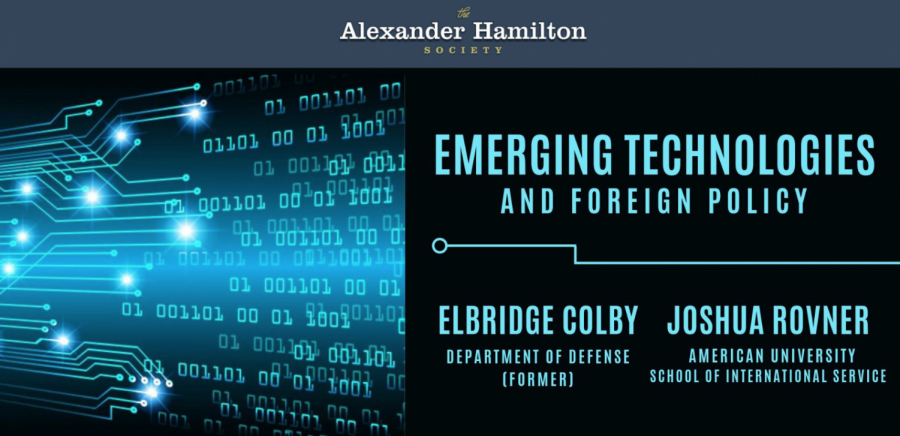Alexander Hamilton Society holds ‘Emerging Technology’ debate
American University’s Alexander Hamilton Society held an event last week on campus to discuss the variety of foreign threats against the US and the importance of Automated Intelligence and cybersecurity have on those threats.
Panelists included Elbridge Colby, director of defense at the Center for a New American Security and former deputy assistant secretary of defense for Strategy and Force Development, and SIS Professor Joshua Rovner. SIS professor and former director of international security at George Mason University, Audrey Cronin moderated the debate.
The discussion began when Cronin asked the panel what they thought was the most immediate threat to the United States.
“In your opinion, what is the most pressing issue the United States faces today,” opened Cronin.
Colby, who describes himself as a “moderate realist,” said to Cronin that he believes China is America’s greatest threat currently.
“While not as malevolent as the Islamic State of Iraq and Levant (ISIL), it is certainly more powerful, and that power can be used to create regional hegemony,” Colby said. Colby thinks China’s investment in US Treasury bills will not serve as a blockade against war, citing the strong trading relationship between Germany and Britain in 1914.
A war with China is plausible, Colby believes, emerging from a limited war in the Western Pacific that could “spiral out of control.”
“Napoleon once said when China rises, it will shake the world,” said Colby, “and China is rising and will continue to rise.”
Rovner concurred with Colby that China is a threat, but he also said a power war is not likely due to the aftermath it has on international politics. Rovner said he believes the combination of growing power and a paranoid, single-party leadership warrants reason for a careful relationship going forward.
“When Great Powers becomes economically strong and build strong militaries they tend to throw their elbows around,” Rovner said “But I don’t think that means that conflict is likely. Quite the opposite, it’s unlikely, but it should be watched carefully.”
Jack Stein and Francesco Feraro, both AU alumni, found the event on Twitter and enjoyed being able to participate in the AU community.
“It’s awesome for AU to have a Center for Security, Innovation, and New Technology because it is a pressing issue,” said Stein, “and we a need to get a handle on it because it’s emerging issue but the cat is also out of the bag already.
“I did a lot of security issues in graduate school and it would have been nice to have the [Center for Security, Innovation, and New Technology] when I was in school,” said Feraro.
The Alexander Hamilton Society relaunched in the fall of 2018, with a mission statement to “promote principled American leadership in a time of unsure and volatile geopolitics,” according to their Facebook page.
“We’ve had four events since we launched and plan to have more in the future,” said Nawal Ali, treasurer of the Alexander Hamilton Society.











